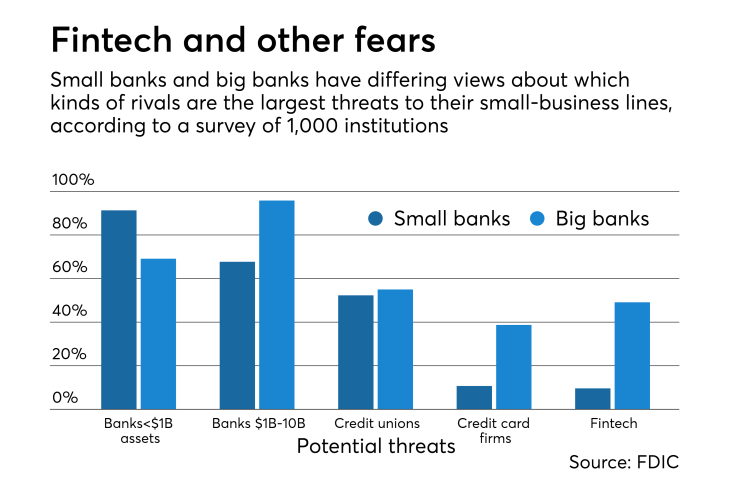Fintechs hoping to make inroads in the small-business market are still trying to overcome a big hurdle — most firms looking for loans still trust banks more than their relatively new tech-savvy competitors.
That remains true even after the financial crisis eroded trust at large in the banking system and the fallout from scandals at firms like Wells Fargo.
"There's a trust factor there, even with a Wells Fargo," said Jacob Schuler, founder and CEO of Alpha Business Bank in Spokane, Wash. "People kind of cared" about Wells "for a while, and then they don't care."
Schuler argues that trust gap is hurting both small businesses and banks. Small businesses afraid to switch are tolerating traditional bank offerings, despite service gaps. Fintechs, meanwhile, are missing an opportunity to help merchants better run their operations.
“Small businesses are much more likely to trust the security provided by their bank as well as the financial institution’s stability than they are to trust a fintech company, especially an emerging one,” said Christine Barry, research director for Aite Group’s worldwide banking practice. “Fintechs demonstrate high levels of innovation and agility and are filling gaps in current bank offerings but they don’t always understand the financial services regulatory environment."

Indeed, Schuler acknowledged that the biggest "struggles" facing his challenger bank are with security and regulation. How fintechs try to close the trust gap with small businesses is one of several issues Schuler and other fintech executives are expected to address at
Ironically, the best way for banks to close the gap may be through bank partnerships, a trend already happening in the market.
“I’m intrigued by the potential for partnership solutions,” said Vivian Merker, partner at Oliver Wyman. “You have fintechs that are coming up with particularly innovative or unique solutions to add value to small-business owners. That’s a very logical and powerful pairing there, where banks who have the relationships and maybe have the trust, to work with fintech providers to drive comprehensive solutions that add value to small-business customers.”
Another way to bridge the gap is to provide outstanding customer service, Schuler said. Banks have emphasized the consumer experience on the retail side, but that hasn't always translated to business lending, he said.
“Our customer service is not banking trained, but retail-oriented so that they can focus on the consumer,” he said. “It comes back to the customer." Banks are "doing that on the retail banking side, but businesses are being left behind.”
Small businesses clearly do have an appetite for more assistance from their banks when managing money. Aite Group recently surveyed 1,000 small businesses and 61% of respondents said it was “challenging” or “extremely challenging” to manage funds. Some 40% of respondents had the same answer when asked how difficult it is to collect money owed to them.
Alpha's aim is to help merchants with such problems by focusing on data aggregation.
“There are trends in income and spending that are a big deal for merchants, especially through lean months, or if that business is seasonal,” Schuler said. “Maybe they work hard at the bicycle shop all summer, but there’s little business in the winter.
“They can look at the data to figure out if they need a lending product to get through those leaner months. They can be proactive in what they can do based on that data.”
Schuler also noted more opportunities will arise for fintechs once they demonstrate to small business they can provide basic services that traditional banks lack.
“We have to start with the basics" like detailed data reports, "and then the icing on the cake is the stuff we’re trying to build to bring value to our customers,” he said.
A lending option from Alpha is almost a certainty in the future, Schuler said. He wants to make sure that’s done the “right way” in an effort to build that trust with small businesses.
“We’re not focused on selling products for the sake of selling products,” Schuler said.





